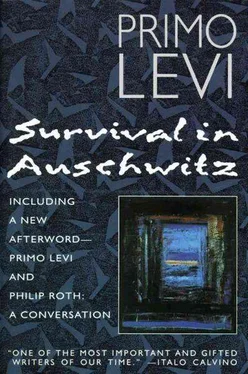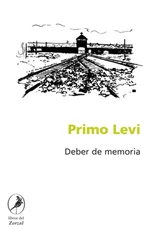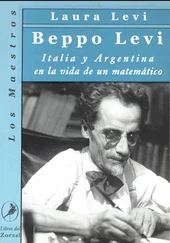25 January. It was Sómogyi’s turn. He was a Hungarian chemist, about fifty years old, thin, tall and taciturn. Like the Dutchman he suffered from typhus and scarlet fever. He had not spoken for perhaps five days; that day he opened his mouth and said in a firm voice:
‘I have a ration of bread under the sack. Divide it among you three. I shall not be eating any more.’
We could not find anything to say, but for the time being we did not touch the bread. Half his face had swollen. As long as he retained consciousness he remained closed in a harsh silence.
But in the evening and for the whole of the night and for two days without interruption the silence was broken by his delirium. Following a last interminable dream of acceptance and slavery he began to murmur: ‘Jawohl’ with every breath, regularly and continuously like a machine, ‘Jawohl’, at every collapsing of his wretched frame, thousands of times, enough to make one want to shake him, to suffocate him, at least to make him change the word.
I never understood so clearly as at that moment how laborious is the death of a man.
Outside the great silence continued. The number of ravens had increased considerably and everybody knew why. Only at distant intervals did the dialogue of the artillery wake up.
We all said to each other that the Russians would arrive soon, at once; we all proclaimed it, we were all sure of it, but at bottom nobody believed it. Because one loses the habit of hoping in the Lager, and even of believing in one’s own reason. In the Lager it is useless to think, because events happen for the most part in an unforeseeable manner; and it is harmful, because it keeps alive a sensitivity which is a source of pain, and which some providential natural law dulls when suffering passes a certain limit.
Like joy, fear and pain itself, even expectancy can be tiring. Having reached 25 January, with all relations broken already for eight days with that ferocious world that still remained a world, most of us were too exhausted even to wait.
In the evening, around the stove, Charles, Arthur and I felt ourselves become men once again. We could speak of everything. I grew enthusiastic at Arthur’s account of how one passed the Sunday at Provencheres in the Vosges, and Charles almost cried when I told him the story of the armistice in Italy, of the turbid and desperate beginning of the Partisan resistance, of the man who betrayed us and of our capture in the mountains.
In the darkness, behind and above us, the eight invalids did not lose a syllable, even those who did not understand French. Only Sómogyi implacably confirmed his dedication to death.
26 January. We lay in a world of death and phantoms. The last trace of civilization had vanished around and inside us. The work of bestial degradation, begun by the victorious Germans, had been carried to its conclusion by the Germans in defeat.
It is man who kills, man who creates or suffers injustice; it is no longer man who, having lost all restraint, shares his bed with a corpse. Whoever waits for his neighbour to die in order to take his piece of bread is, albeit guiltless, further from the model of thinking man than the most primitive pigmy or the most vicious sadist.
Part of our existence lies in the feelings of those near to us. This is why the experience of someone who has lived for days during which man was merely a thing in the eyes of man is non-human. We three were for the most part immune from it, and we owe each other mutual gratitude. This is why my friendship with Charles will prove lasting.
But thousands of feet above us, in the gaps in the grey clouds, the complicated miracles of aerial duels began. Above us, bare, helpless and unarmed, men of our time sought reciprocal death with the most refined of instruments. A movement of a finger could cause the destruction of the entire camp, could annihilate thousands of men; while the sum total of all our efforts and exertions would not be sufficient to prolong by one minute the life of even one of us.
The saraband stopped at night and the room was once again filled with Sómogyi’s monologue.
In full darkness I found myself suddenly awake. ‘L’pauv’-vieux’ was silent; he had finished. With the last gasp of life, he had thrown himself to the ground: I heard the thud of his knees, of his hips, of his shoulders, of his head.
‘La mort I’a chassé de son lit,’ Arthur defined it.
We certainly could not carry him out during the night. There was nothing for it but to go back to sleep again.
27 January. Dawn. On the floor, the shameful wreck of skin and bones, the Sómogyi thing.
There are more urgent tasks: we cannot wash ourselves, so that we dare not touch him until we have cooked and eaten. And besides: ‘… rien de si dégoutant que les débordements,’ said Charles justly; the latrine had to be emptied. The living are more demanding; the dead can wait. We began to work as on every day.
The Russians arrived while Charles and I were carrying Sómogyi a little distance outside. He was very light. We overturned the stretcher on the grey snow.
Charles took off his beret. I regretted not having a beret.
Of the eleven of the Infektionsabteilung Sómogyi was the only one to die in the ten days. Sertelet, Cagnolati, Towarowski, Lakmaker and Dorget (I have not spoken of him so far; he was a French industrialist who, after an operation for peritonitis, fell ill of nasal diphtheria) died some weeks later in the temporary Russian hospital of Auschwitz. In April, at Katowice, I met Schenck and Alcalai in good health. Arthur has reached, his family happily and Charles has taken up his teacher’s profession again; we have exchanged long letters and I hope to see him again one day.
A Conversation with Primo Levi by Philip Roth
On the September Friday in 1986 that I arrived in Turin—to renew a conversation with Primo Levi that we had begun one afternoon in London the spring before — I asked to be shown around the paint factory where he’d been employed as a research chemist and, afterward, until retirement, as manager. Altogether the company employs fifty people, mainly chemists who work in the laboratories and skilled laborers on the floor of the plant. The production machinery, the row of storage tanks, the laboratory building, the finished product in man-sized containers ready to be shipped, the reprocessing facility that purifies the wastes—all of it is encompassed in four or five acres seven miles from Turin. The machines that are drying resin and blending varnish and pumping off pollutants are never distressingly loud, the yard’s acrid odor—the smell, Levi told me, that clung to his clothing for two years after his retirement—is by no means disgusting, and the thirty-yard dumpster loaded to the brim with the black sludgy residue of the antipolluting process isn’t particularly unsightly. It is hardly the world’s ugliest industrial environment, but along way, nonetheless, from those sentences suffused with mind that are the hallmark of Levi’s autobiographical narratives.
However far from the spirit of the prose, the factory is nonetheless a place clearly close to his heart; taking in what I could of the noise, the stink, the mosaic of pipes and vats and tanks and dials, I remembered Faussone, the skilled rigger in The Monkeys Wrench, saying to Levi, who calls Faussone “my alter ego”: “I have to tell you, being around a work site is something I enjoy.”
As we walked through the open yard to the laboratory, a simply designed two-story building constructed during Levi’s managerial days, he told me: “I have been cut off from the factory for twelve years. This will be an adventure for me.” He said he believed that nearly everybody once working with him was now retired or dead, and, indeed, those few still there whom he ran into seemed to strike him as specters. “It’s another ghost,” he whispered to me, after someone from the central office that had once been his had emerged to welcome him back. On our way to the section of the laboratory where raw materials are scrutinized before moving to production, I asked Levi if he could identify the chemical aroma faintly permeating the corridor: it smelled like a hospital corridor. Just fractionally he raised his head and exposed his nostrils to the air. With a smile he told me: “I understand and can analyze it like a dog.”
Читать дальше












